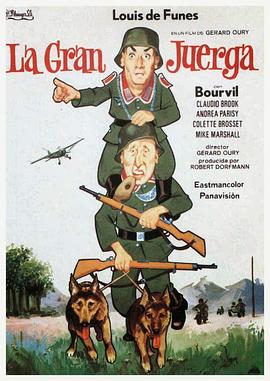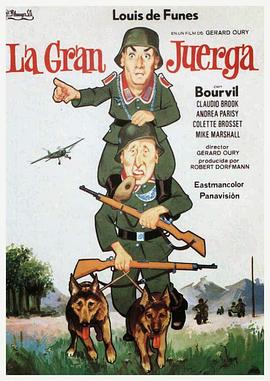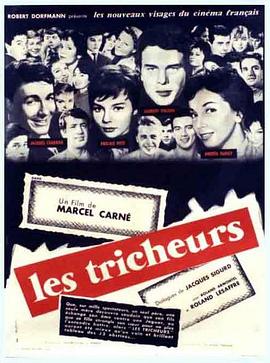主演的影片
1966
电影
/
电影解说
法国
二战期间,英国一架飞机在执行轰炸任务中,被德军击中,几名英国士兵被迫跳伞逃生。他们约好在土耳其浴室见面,并用这次行动的代号“鸳鸯茶”作为接头暗号。他们分别降落在法国巴黎德军占领区的不同地点。大胡子中队长雷金纳德被动物园管理员所救。而另外两名士兵,也分别在油漆匠奥古斯德 (布尔维尔 饰)和乐队指挥斯塔尼斯拉斯(路易·德·费内斯 饰)的帮助下掩藏好了。即便德军展开了全城的搜索,油漆匠、指挥和中队长还是在浴室顺利地会面,几经辗转,英国士兵终于接上了头。几个原本并不认识的人,就这样结成了生死同盟,与敌人展开了斗智斗勇的生死游戏。同时,也闹出了不少温情的笑话。他们用微薄的力量对抗严酷德军,险相迭生,滑稽搞笑,为了逃出虎口,共同战斗。©豆瓣
电影解说
1966
动漫
/
海外动漫
法国
亨利·热内斯
保罗·普雷博伊斯特
保罗·梅塞
克劳迪奥·布鲁克
加布里埃尔·戈班
吕迪·勒努瓦
安德丽·帕里西
居伊·格罗索
布尔维尔
彼得·雅各布
本诺·施特岑巴赫
汉斯·迈尔
特里-托马斯
玛丽·杜布瓦
玛丽·马凯
玛格·阿夫里尔
皮埃尔·巴斯蒂安
皮埃尔·贝尔坦
皮埃尔·鲁塞尔
科莱特·布罗塞
米歇尔·莫多
西戈德·拉普
诺埃尔·达扎尔
赖因哈德·科尔德霍夫
赫尔穆特·施奈德
路易·德·菲奈斯
迈克·马歇尔
雅克·博杜因
雅克·萨布隆
二战期间,英国一架飞机在执行轰炸任务中,被德军击中,几名英国士兵被迫跳伞逃生。他们约好在土耳其浴室见面,并用这次行动的代号“鸳鸯茶”作为接头暗号。 他们分别降落在法国巴黎德军占领区的不同地点。大胡子中队长雷金纳德被动物园管理员所救。而另外两名士兵,也分别在油漆匠奥古斯德 (布尔维尔 饰)和乐队指挥斯塔尼斯拉斯(路易·德·费内斯 饰)的帮助下掩藏好了。即便德军展开了全城的搜索,油漆匠、指挥和中队长还是在浴室顺利地会面,几经辗转,英国士兵终于接上了头。几个原本并不认识的人,就这样结成了生死同盟,与敌人展开了斗智斗勇的生死游戏。同时,也闹出了不少温情的笑话。他们用微薄的力量对抗严酷德军,险相迭生,滑稽搞笑,为了逃出虎口,共同战斗。
已完结
1966
电影
/
喜剧片
法国
亨利·热内斯
保罗·普雷博伊斯特
保罗·梅塞
克劳迪奥·布鲁克
加布里埃尔·戈班
吕迪·勒努瓦
安德丽·帕里西
居伊·格罗索
布尔维尔
彼得·雅各布
本诺·施特岑巴赫
汉斯·迈尔
特里-托马斯
玛丽·杜布瓦
玛丽·马凯
玛格·阿夫里尔
皮埃尔·巴斯蒂安
皮埃尔·贝尔坦
皮埃尔·鲁塞尔
科莱特·布罗塞
米歇尔·莫多
西戈德·拉普
诺埃尔·达扎尔
赖因哈德·科尔德霍夫
赫尔穆特·施奈德
路易·德·菲奈斯
迈克·马歇尔
雅克·博杜因
雅克·萨布隆
二战期间,英国一架飞机在执行轰炸任务中,被德军击中,几名英国士兵被迫跳伞逃生。他们约好在土耳其浴室见面,并用这次行动的代号“鸳鸯茶”作为接头暗号。 他们分别降落在法国巴黎德军占领区的不同地点。大胡子中队长雷金纳德被动物园管理员所救。而另外两名士兵,也分别在油漆匠奥古斯德 (布尔维尔 饰)和乐队指挥斯塔尼斯拉斯(路易·德·费内斯 饰)的帮助下掩藏好了。即便德军展开了全城的搜索,油漆匠、指挥和中队长还是在浴室顺利地会面,几经辗转,英国士兵终于接上了头。几个原本并不认识的人,就这样结成了生死同盟,与敌人展开了斗智斗勇的生死游戏。同时,也闹出了不少温情的笑话。他们用微薄的力量对抗严酷德军,险相迭生,滑稽搞笑,为了逃出虎口,共同战斗。
已完结
1958
电影
/
剧情片
法国
Middle class student Bob Letellier enters a new world when he meets Alain, a free-thinking rebel who, along with his group of young Parisians, has opted for a life of instant gratification instead of work and commitment. At a party, Bob meets a young woman, Mic, who appears to be just as carefree and cynical as Alain. Mic's only dream is to own a luxury car, and with Bob's help, she manages to find the money to but it. Mic's friend Clo discovers she is pregnant and, not knowing who the father is, she asks Bob to marry her. When they next meet at a party, Bob and Mic deny that they have any feelings for one another - a declaration that soon leads to tragedy... Marcel Carné is widely regarded as one of the standard bearers of French quality cinema of the 1930s and 1940s, responsible for such masterpieces as Quai des brumes (1938) and Les Enfants du Paradis (1945). How ironic then that, in 1958, towards the end of his film-making career, he should make a film which dared to portray the attitudes and behaviour of the 1950s youth, in a way that effectively captures the mood and sentiment of the time. Les Tricheurs was a hugely controversial film, not least because of its blatant depiction of adolescent free-love, and was even banned in some regions of France. It also received some intensely unfavourable reviews, most notably from the young hotheads on the Cahiers du cinéma such as François Truffaut who cited this film as a prime example of the decline of French cinema into mediocrity. In spite of all this negative press, the film proved to be an astonishing commercial success, attracting five million cinema-goers, and was awarded the Grand Prix du Cinéma français in 1958. Whilst Les Tricheurs is not as flawless as Carné's earlier masterpieces, it is nonetheless a significant work, having the power to both shock and move its audience, whilst having great entertainment value. It evokes the mood of its time in a way that few French films of this period did, depicting young people as pleasure-seeking rebels, rejecting the austerity and discipline of the previous generation whilst pursuing a life without cares, responsibilities or love. Similarities with James Dean's films of the 1950s (most notably Rebel without a Cause) are apparent, although Carné's treatment of young people is far more abstract - in his film they merely symbolise a world that has lost its way, more or less victims of post-war prosperity. Although the young people in Les Tricheurs lack the authenticity to be totally credible, the film does make an important, and indeed quite disturbing point, about where the permissive society may be heading. Much of the pleasure of the film is in the performances from its four lead actors, Jacques Charrier, Pascale Petit, Laurent Terzieff and Andréa Parisy, although only Terzieff is really convincing in his role. Marcel Carné originally considered Alain Delon and Jean-Paul Belmondo for the parts of Bob and Alain respectively, before opting for Charrier and Terzieff. As a consolation, Carné offered Belmondo a smaller part in the film - alas too small for the actor to be noticed by the public. Belmondo's breakthrough had to wait until the following year when he starred in Jean-Luc Godard's revolutionary A bout de souffle, a film which offers a very different perspective of the youth generation.
已完结


![虎口脱险[电影解说]](/data/images/8gKgdcHu/202311/933c165f3c5589a2b73c1c8acfb63d95.jpeg)


